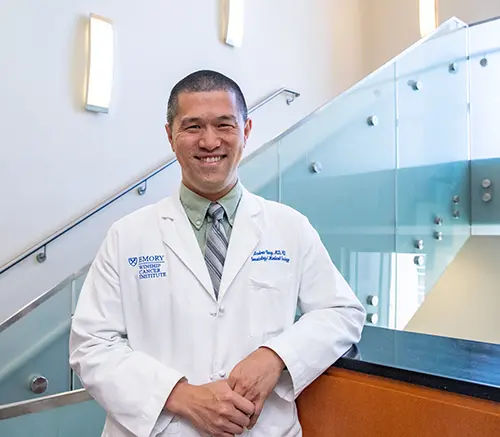
In January 2022, CLL Society formally launched a Research Program that seeks to financially support innovative research efforts in CLL. The purpose of CLL Society’s Young Investigator Award is to provide emerging scientists who are early in their careers with substantive grants that will help to grow and develop a new generation of researchers who are committed to solving the unmet needs of the disease. We invite you to read more about CLL Society’s Research Program.
About the 2023 Young Investigator Award Recipient
Andres Chang, MD, PhD, is currently an Instructor at Winship Cancer Institute of Emory University in Atlanta, Georgia. He is originally from Guatemala, and immigrated to the US to attend college where he completed his doctorate work at the University of Kentucky. Then he transferred to Emory University School of Medicine to complete his internal medicine residency and hematology-oncology fellowship training. He stayed on at Emory University as faculty where his clinical and scientific interests have been to study the immune response in patients with CLL / SLL.
CLL Society’s Director of Scientific Affairs & Research, Robyn Brumble, spoke with Dr. Chang to discuss his research project titled, “The Adaptive Immune Response in CLL.”
What is the adaptive immune response and why is it important to understanding how it is impacted by CLL / SLL?
The immune system is divided into two categories-the innate immune system and the adaptive immune system. The innate immune system is the part that we are born with that is pre-programmed to recognize certain patterns that bacteria and viruses have. It acts as our body’s first line of defense by being able to rapidly fight off infections. The adaptive immune system is that which we are not born with. It is the part that must learn how to respond when it is exposed to new germs or pathogens, so that the next time we are exposed it will know how to better respond to fight off infection.
The adaptive immune system is divided into both B-cells and T-cells. B-cells are responsible for making antibodies when exposed to something new. T-cells help B-cells make those antibodies and are then also responsible for killing cells that are infected with viruses and bacteria.
We know that CLL / SLL is a cancer of the B cells which are part of the immune system. We often talk about how those living with CLL / SLL are considered moderately to severely immunocompromised, regardless of whether they are currently receiving treatment or not. But why exactly are they considered immunocompromised even when they are not on treatment?
This is because CLL / SLL is a cancer of the B-cells, which is an important part of the immune system that is responsible for forming antibodies that fight off infection. When these cancerous B-cells are not functioning properly, the immune response is impaired because they aren’t able to send or receive the appropriate signals from other immune cells which prevents the immune system overall from being able to work well. Also, many of the treatments for CLL / SLL patients affect their non-cancerous immune cells. So, the combination of a dysfunctional immune system and some of the cancer treatments given to patients lead to varying degrees of a compromised immune system.
But understanding which precise signals that are being sent by the cancerous B-cells to other parts of the immune system and what other factors combine to generate a dysfunctional immune system that we see in those with CLL / SLL is not well understood. And without this knowledge, we cannot come up with ways to possibly reverse immune dysfunction so much more research in this area is needed.
We have known for a long time that one of the main causes of mortality for those with CLL is infections, particularly pneumonia. There has long been an emphasis on getting all the recommended age-appropriate vaccinations, as well as an emphasis on getting all your vaccines early in the disease-especially before you start any CLL / SLL treatments. But before the COVID-19 pandemic, there was never any recommendations for those with CLL / SLL to be checked after vaccination to see how well they responded to the vaccines they received. And while avoiding actively sick people has always been recommended, there were no recommendations to wear masks to help provide protection against infection. Can you talk a little about how the pandemic has changed things in terms of shining a spotlight on the increased infection risks and impaired vaccine responses in those with CLL / SLL?
The pandemic opened the eyes of the scientific community and the public to the seriousness of being immunocompromised when exposed to infection. We did know for a long time that CLL / SLL patients were more prone to infections, very little research attempted to address or quantify the magnitude of the problem. The research focus was more so on other areas of the disease. COVID-19 has put the spotlight on this issue and provided the scientific community a unique opportunity to gain a better understanding of the problem because we began to see on a daily basis very early in the pandemic that those with CLL / SLL were doing much worse when they became infected. The pandemic also helped the scientific community obtain access to the right tools in the laboratory, new vaccines, better funding that created new tools and technologies. So, we are now better poised to perform this research that will hopefully help us gain a better understanding surrounding the immune response in those living with CLL / SLL.
Also, since the beginning of the pandemic, we have gained a wealth of knowledge about the degrees of immune dysfunction that is occurring in patients. This is particularly true when it comes to quantifying the amounts of antibodies that were produced in response to either infection or COVID-19 vaccination. But what is still lacking is the understanding of the mechanisms or why a decreased antibody response occurs. The goal of the research project is to gain a better understanding of the immune system processes involved at a cellular level, so that ultimately there will be a better way to reverse immune suppression of those with CLL / SLL in the future.
Let’s go a little bit deeper into the research project itself. Can you go a little deeper into what it is exactly that you are doing?
There have been several reports that have shown patients with CLL / SLL, regardless of if they have received treatment or not, produce fewer antibodies after COVID-19 vaccination. We have observed in previous studies that some patients produce more antibodies than others. That certain patients who are on various types of treatments are predisposed to making less antibodies. And there are some who do not make any antibodies at all, even if they have never been on treatment before. We still don’t understand why the responses are all different, and we know we do not yet have the full story.
The aim of this research project is to understand why the non-cancerous B-cells (the ones that are supposed to still be making antibodies) are also not working well. More specifically, by looking at what factors are making them not produce antibodies. There will be several experiments conducted within this research study to attempt to both measure and characterize these specific cell populations that are supposed to recognize the COVID-19 cell protein in the vaccines. Then they will be studied over time and compare them to similar cells that are from those without CLL / SLL to see what kinds of factors are different that might be making patients produce less antibodies.
Why do you believe your research is so important for those with CLL and SLL, and what do you hope to gain as a result of what you learn?
While the focus of this research study is examining the immune responses of those with CLL / SLL to COVID-19 vaccines, the hope is to take the findings and apply them to understanding the impaired responses to other vaccines as well. What is found could then be applied to others such as influenza, shingles, pneumonia, and RSV. This information is needed before the scientific community can start thinking about newer ways and improved methods to induce better immune responses in CLL / SLL patients to eventually protect them better from infection.
Do you have any final thoughts to add as we close?
The research that CLL Society is funding will provide the scientific community with important information that will help to understand why CLL / SLL patients make less antibodies in general. While COVID-19 is being used in this particular study as the tool for learning more about immune responses, the hope is to use this research to understand the immune response more broadly so that scientists can design better methods later on to help protect against all types of infections.
By studying how non-cancerous B-cells in those with CLL / SLL behave, it can also help researchers to understand why some CLL / SLL develop autoimmune complications. So, by understanding the unique immune responses and processes better, we can only then begin to search for potential mechanisms to address not only infections but also autoimmune diseases that often occur in those with CLL / SLL.
Please watch the interview between CLL Society’s Director of Scientific Affairs and Research, Robyn Brumble, RN, MSN and Andres Chang, MD, PhD.
CLL Society is one of the only blood cancer organizations whose research program is dedicated solely to funding CLL / SLL research, and the organization is committed to continue growing the number of research efforts that are funded every year. CLL Society relies on the generous donations and support from our community to fund all programs and services, including research. Please consider supporting our efforts today!



